An Interview with Andrew Keller, HKC
By Adrienne Harvey, SrPCC, RKC-II, CK-FMS
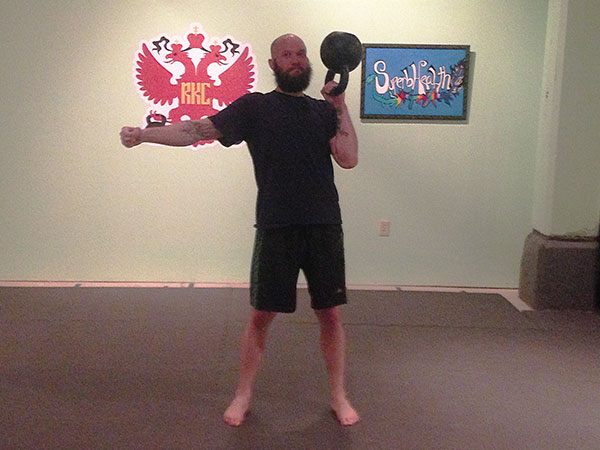
Dragon Door: Why did you start training with kettlebells?
Andrew Keller: I moved to Milwaukee about 2 years ago and was looking for a way to get in shape. I used to live in the middle of nowhere, and we only had standard gyms which never seemed to work for me. I’d heard about kettlebells from people in the military and people interested in self defense. They were using
kettlebells with great results. A quick internet search for kettlebells led me to Nick Lynch's website. About a week after meeting and talking with him I started training at his gym. I’ve been going to 3-5 classes with him each week ever since. In July that will make it two years!
Dragon Door: Nick mentioned that you’d lost about 80lb, was that also part of your your original interest in training?
Andrew Keller: That was the initial goal. I knew about the other benefits that came with kettlebell training—the strength and mobility—from my research. But, I didn't really know how those benefits would really happen. I thought I’d have to do 15 different things along with kettlebells, but I ended up getting everything in one. My initial thoughts were to lose weight along with improving my mobility and increasing my strength.
Dragon Door: And it sounds like you have a lot of other things going on in your life too…
Andrew Keller: I’m in school for mechanical engineering and have a full time job. Being able to get everything I need from training in 45 minutes each night is a great benefit for me. And training at Nick’s gym has had even more benefits. I was new to town and other than school and work didn't really have a social network. Now, my social network has grown through Superb Health. The ability to train for 45 minutes to an hour—then feel completely great afterwards is awesome.
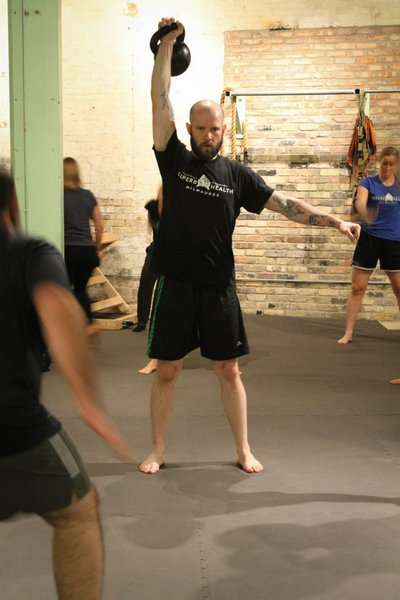
The efficiency of the training really shocked me. It’s one thing to read research, but once I talked to someone who had been training this way for a long time and could really explain how this little cannonball can provide you all of these positives, I started to understand. I was used to training for 10 minutes on one machine, 5 minutes on another, etc. But now I only need to use the kettlebell and
bodyweight exercises. The biggest thing for me has been the pure efficiency of the "cannonball with a handle" and what it's done for me.
Dragon Door: Many people begin by researching kettlebells on the internet, but don't always follow through and find a good coach. How did you decide to get training instead of just trying to figure it out on your own online?
Andrew Keller: I certainly feel that
finding a coach was a good thing for me. And that just might be my engineering brain at work. There are certainly things that I've been able to figure out and do well, without being trained. At the same time, I know there are people I can learn from who have more experience. I brought up the military/self defense world earlier and the same thing is true there. I was taught how to shoot at an early age and continue to work on my own at a pretty good level. But I know that finding good people with more experience can make me better. It's been the same with kettlebells. While I might have been able to teach myself the swing, squat, and get-up, I am happy that someone like Nick was able to really break down the moves. He helped me learn how to make them cleaner, safer and more effective—and I am extremely grateful for that.
Dragon Door: Nick mentioned that your kettlebell training may have effected your shooting accuracy, what do you think?
Andrew Keller: My grip strength is greatly improved, which is always helpful with shooting. My improved mobility has certainly helped when I train ground fighting. The first time I took a ground fighting class I was weak, overweight, and couldn’t move well. After about 6-7 months of
kettlebell training I went back and did the same class and while I was still a little overweight I was lighter, stronger, and could move better—it really changed everything. I hope to do that class again as I continue to improve for a third data point.
Dragon Door: What kind of class is it?
Andrew Keller: It's a class dealing with situations that may arise in extreme close quarters. It's a lot of one and multiple attackers between touching distance and three yards away. It teaches how to deal with people who are trying to hurt you. It’s a very physical class and designed to help you understand these kinds of tests—even though it’s statistically unlikely—before they happen in life.
Dragon Door: And you signed up for an upcoming RKC workshop, too. What inspired you to go for it?
Andrew Keller: He had asked me a while ago if the RKC was something that I might want to do someday. Since doing the HKC in October, I have been teaching kettlebells two nights a week at his gym and realized that I really enjoy the teaching aspect. I think going to the
RKC will open up more opportunities and make me a better teacher. I am very excited about that.
Dragon Door: What did you like most about the HKC certification?
Andrew Keller: I think the HKC was the first time I worked with a whole new group of people at that skill level. I felt pretty good about my technique for the tests. And I was also tested on my ability to teach a get-up to someone I didn’t already know. We were learning from instructors who brought a lot of experience. I think that I always have room for improvement. No matter how small the suggestion or tweak is, it can make a big difference.
At the
HKC I felt I was able to smooth out my technique—especially with the get-up. After the HKC I felt really good about the get-up, and learned how just a little change in something like hand placement can make things just that much better.
Dragon Door: What's your favorite kettlebell exercise?
Andrew Keller: The swing, because there are so many benefits with it. I really enjoy the conditioning aspect of the swing, and it makes the hips stronger, especially with higher reps. I just think the swing is an exercise that is hard to beat. Double kettlebell front squats are my other favorite.
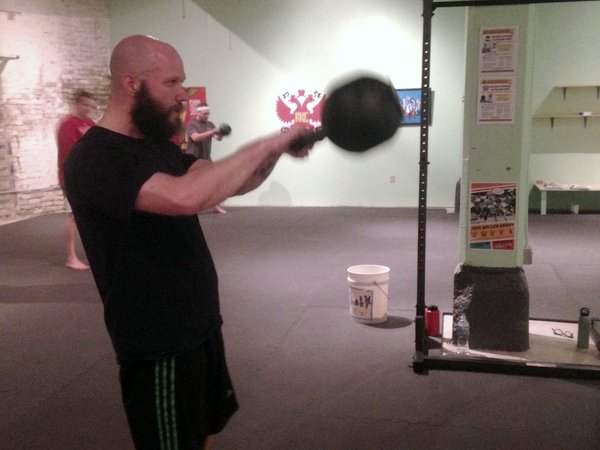
Dragon Door: What’s your advice for someone considering kettlebell training for fat loss like you did at first?
Andrew Keller: I think they should just go ahead and do it! Studies show the caloric output of kettlebell training vs. sitting on a bike. I haven't been to a standard gym in a long time because standard training just didn't work for me. It might help a little bit, but I never felt the same commitment as I do with kettlebell training. I think that if you're busy, it’s still very hard to say you can't take just 45 minutes out of your day to work out with kettlebells.
In over a year and a half, I haven’t found a downside to kettlebell training. Some days I've come out of the gym sore and really tired, but it wears off by the time I get home, and then I feel great. I haven’t had any injuries and I think that comes with the fact that I train with someone like Nick who is an RKC Team Leader. Like anything, there’s plenty you can do wrong with kettlebell training, but those risks are mitigated by good training and coaching.
Dragon Door: What's next for you? You've got the RKC coming up, so what's next in your training and life?
Andrew Keller: The RKC is the next big step. Otherwise I am plugging away with school and work for the foreseeable future. School and work really keep me on my toes and are my main focuses. I am working full time, but school is not full time. I wish I could just take a sabbatical from work and just finish school but unfortunately that’s just not how my life works right now. So I try to schedule the really tough classes on different semesters, and figure out how many classes I can realistically take per semester on top of work.
I have a pretty quiet life, I have 2 dogs and am getting married next year. Other than that, I wake up, eat breakfast—well, I just finished breakfast before I talked to you—go to kettlebells, got to work, sleep, then I get up go to school.
Dragon Door: Wait a minute... it's the middle of the afternoon and you just mentioned breakfast. Are you working third shift?
Andrew Keller: Yes, I am.
Dragon Door: That brings up some very interesting issues. Many people have a very difficult time and experience health issues while working 3rd shift jobs. How do you make sure that you’re getting enough rest, exercise and balance in your life? Is kettlebell training helping?
Andrew Keller: I think that if I didn't have it I would probably be dead! Especially when I am in school, I have a very hectic schedule. I’m sure many people have more hectic schedules, but I do have days when I come home from work, rest for just 45 minutes, then go to school for two hours, come home for 3-4 hours of sleep, then get up at 4PM if I want to go to kettlebells that night. Then, I will be up from 4PM until 7AM the next morning. I think that without kettlebells, and without being in the shape I’m in now that I wouldn’t be able to do it.
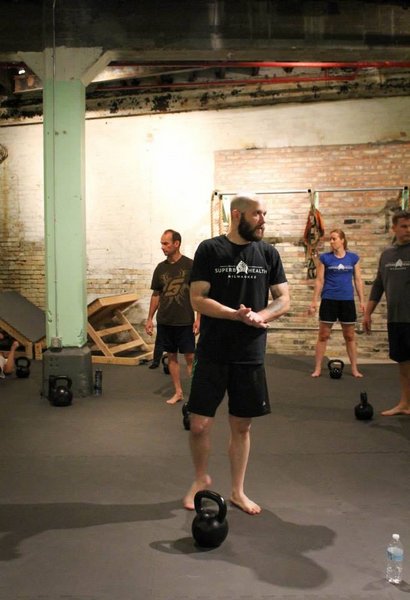
There are definitely days when I feel like I couldn't do it without kettlebells. It's weird because those 45 minute evening classes are my "morning" exercise and give me a boost for the day. And if I’m not teaching that day, I won’t know what the kettlebell routine will be! It might be a ton of swings, presses, squats, cleans, and get-ups! But, I've never felt like the kettlebell workouts have made me too tired to go to work or school. While the workouts are challenging, I don’t think that they have to completely wear me out for me to benefit.
Dragon Door: What is your full time job?
Andrew Keller: I am a machinist at a lock manufacturer, and it’s a job with a lot of thinking throughout the night—I can’t just sit back. I have a lot to do and think about while working with hydraulic machines that perform twelve different operations. It’s pretty neat but there’s a lot going on.
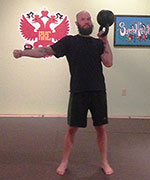 Andrew Keller, HKC teaches at Superb Health in Milwaukee, WI. He can be contacted through the Superb Health website.
Andrew Keller, HKC teaches at Superb Health in Milwaukee, WI. He can be contacted through the Superb Health website.
Back